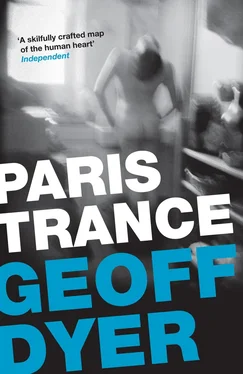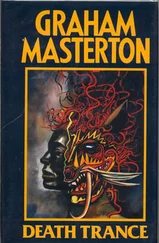‘My name is Luke Barnes. We spoke on the phone this morning about my coming in to work.’ Luke advanced into the room and held out his hand. Lazare waved him away.
‘So get out there and start working. Bernard will tell you what to do.’ He swivelled round, picked up the phone and began jabbing numbers.
Bernard introduced Luke to everyone. He was tall, confidently nervous. He was wearing jeans — which he almost never wore — and the blue work shirt which, as it grew older and softer, would be reserved for evenings when no wear and tear could be expected. His sleeves were rolled up above his elbows. He had that brittle friendliness of the Englishman adapting to a life larger than the one he had so far encountered. He seemed too tall to carry off the manners that he had evolved to diminish his awkwardness. Perhaps I didn’t notice these things at the time. It is hard to say, difficult to preserve those first impressions because they are being changed by second — and third and fourth — impressions even as they are registering as impressions. Even when we recall with photographic exactness the way in which someone first presented themselves to us, that likeness is touched by every trace of emotion we have felt up to — and including — the moment when we are recalling the scene. He was tall, thin. He looked English — something in the set of his mouth. His face was angular, the jawline pronounced. He was handsome, attractive; as yet his circumstances had played almost no part in determining his expression. You could not yet read his history in his face; his looks were a fact of biology. The eyes were blue, full of looking, but — how else to say it? — behind the blue (or am I amending that first meeting in the light of what came later?) there was a remoteness, almost a refusal.
We shook hands. He had the handshake of a thin person who has learned how to make a good impression by shaking hands firmly even though that strength always feels as if it is made up of bones and nerves. He knew there was a way of getting an intensity of feeling into shaking hands but he had not learned how to do it. He was one of those people who have to learn everything. I say ‘one of those people’ and I am not sure why. Perhaps because, as I got to know him better, he came to seem so emphatically himself, so individual. Perhaps it is from people like this that we come to an understanding of types. When I met him that day — or so it seems to me now — he was poised on the brink of becoming himself, as I came to know him.
‘Vas-y,’ said Bernard. ‘Je vais te dire comment qu’on fait.’ Which was to clamber up to the second tier of storage racks and catch the packages of books thrown to him by Daniel before throwing them down to Matthias who piled them on to the trolley which Ahmed trundled into the post room. There had been some debate as to whether chaining packages like this was the most efficient way of getting them from the storage racks into the post room. Possibly it was not, but for anyone who had seen footage of soldiers — of the Eighth Army ideally, wearing shorts in the blazing heat of north Africa — tossing supplies from one man to another, it had an inescapable attraction. Also, there was that slight — very slight — element of fun, of sport, of risk, which comes from throwing and catching anything, even dull packets of textbooks. On Luke’s first day, though, there was no time to relish these finer aspects of the job. A sudden rush of orders had come in, all needing to be dispatched that day. Lazare was banging on the office window constantly, phone in one hand, cigarette in the other, gesturing to Bernard to hurry, demanding to know why the order for Auxerre had not been sent out.
‘ Parce que c’est pas à expédier avant jeudi.’
‘Pas celle-là merde, je te cause de la commande pour l’autre boîte. Comment elle s’appelle déjà?’
‘Ouais, celle-là elle est partie hier.’
At which Lazare would permit himself a smile before ushering Bernard back into the warehouse and calling out, ‘Et qu’est-ce que tu as fait avec celle pour Lyon?’
He was a good boss, Lazare. Once you realized that whipping himself into a froth of anger and irritation was essential to his contentment it was easy to work with him. He had two children and a sweet-tempered wife. She came by occasionally and told us how, if Lazare had expended enough angry energy in the day, he would sleep perfectly. She was able to gauge his days by his mood in the evenings. If he was cranky and short that meant it had been an easy day without problems. If he came home smiling, relaxed, a bottle of wine in hand, that meant there had been a series of deadlines, problems and escalating difficulties.
‘Le stress est son truc,’ she said.
We worked late that first day. By the time we left it was growing dark and Luke’s arms were numb with effort. We went to the Café Roma for a beer, another beer and a bowl of pasta each. We were all tired and the beer made us light-headed. Although Luke had hardly spoken to anyone he already felt that he belonged, was part of the group: an unexpected side-effect of Lazare’s abrasive ‘managerial’ style was that the staff quickly developed a group identity. Luke didn’t mention the book he had come to write. He didn’t mention anything much. He spent most of that first evening sitting quietly, smiling, laughing readily enough but not initiating conversation with anyone.
We paid for the meal, tossing a pile of notes into the middle of the table and getting up to leave before the waiter came to collect them.
Outside, the sky was turquoise, streaked black with cloud. People waved goodbye to each other, began heading home. Alex asked Luke where he lived.
‘In the First, rue de la Sourdière. For the moment.’
‘Are you taking the Métro?’
‘Yes.’
‘Okay, we’ll walk together. I live near there, near the Métro.’
People talk about love at first sight, about the way that men and women fall for each other immediately, but there is also such a thing as friendship at first sight. Although Luke and Alex had said little to each other there was an immediate ease and sympathy between them. Alex was shorter than Luke, strongly built. His hair was cropped army short. He walked fast, exuding energy, as if the idea of a stroll had never entered his head. Appropriately enough, he had come to Paris in March — though not, like Luke, with the idea of pursuing any kind of literary project — and had been working at the warehouse since late June. He’d been in the south of France for most of August and had only been back at work for a couple of days when Luke started.
‘What’s it like living in rue de la Sourdière?’
‘Awful. The street is OK but the neighbourhood’s not so good. And my apartment — well, it’s a sad place. It’s seen better days.’
‘How long have you been there?’
‘Almost two months.’
‘And it’s the first place you lived in?’
‘Yes.’
‘Everybody starts out in a dump. It’s a rite of passage. You do your time in a cesspit, you’re about to kill yourself, and then, hopefully, something better comes up.’
‘What if it doesn’t?’
‘Then you go ahead and kill yourself.’
‘And no one notices.’
‘Neighbours, generally, are alerted by the stench.’
‘My place smells bad enough already. No one would notice.’
‘That’s probably the previous tenant. Where would you like to live?’
‘Round here.’
‘You should. It’s great.’
They walked in silence for a few moments, Luke hoping that Alex would suddenly remember that a friend of his was leaving an apartment just a few blocks away. Instead he asked Luke if he wanted a drink at the Petit Centre, the bar on rue Moret that is not there any more.
Читать дальше












